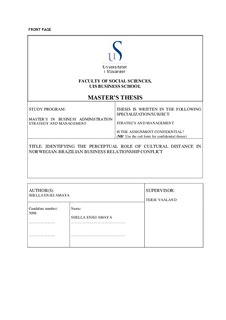| dc.contributor.advisor | Vaaland, Terje | |
| dc.contributor.author | Amaya, Shella | |
| dc.coverage.spatial | Brazil | nb_NO |
| dc.date.accessioned | 2018-09-18T12:18:50Z | |
| dc.date.available | 2018-09-18T12:18:50Z | |
| dc.date.issued | 2018-02 | |
| dc.identifier.uri | http://hdl.handle.net/11250/2563215 | |
| dc.description | Master's thesis in Business | nb_NO |
| dc.description.abstract | Business to business relationships across cultures is growing in importance due to improved transportation, communication technologies and globalisation thus making it easier for businesses to trade across national boundaries. Building and maintaining good business relationships is imperative for international business success. However, cultural differences between parties in a business relationship may influence the strength of the relationship because the behaviour and expectation of each party is influenced by their culture. This thesis is designed to explore the perceptual role of cultural distance in Norwegian- Brazilian business relationship conflict.
This study seeks to contribute to the understanding of business relationships when parties are pressurised. The findings of this study will equip Norwegian managers with usable and intelligent information for managing cultural differences and conflict. In addition, these findings will provide relevant insights and recommendations to stakeholders wishing to establish businesses in Brazil.
The research method is a qualitative, exploratory cross-sectional study of eight Norwegian companies operating in Brazil. Data collection took place in Rio de Janeiro, over a period of two weeks. Semi-structured interviews were conducted with nine informants to find out their perception of cultural differences and how these differences affect their relationship with business partners. The participants were selected using purposive sampling involving both criterion and convenience sampling. The data was analysed through an interpretive paradigm using the Ritchie and Spencer’s (1994) framework analysis. The findings reveal that cultural differences in terms of power distance, uncertainty avoidance, communication pattern, trust and attitude to time, cause misunderstanding, misinterpretation, frustrations, financial loss, etc in business relationship hence increasing the risk of conflict. Implications of the study are highlighted. | nb_NO |
| dc.language.iso | eng | nb_NO |
| dc.publisher | University of Stavanger, Norway | nb_NO |
| dc.relation.ispartofseries | Masteroppgave/UIS-HH/2018; | |
| dc.subject | økonomi | nb_NO |
| dc.subject | administrasjon | nb_NO |
| dc.subject | conflict | nb_NO |
| dc.subject | cultural distance | nb_NO |
| dc.subject | strategi | nb_NO |
| dc.subject | ledelse | nb_NO |
| dc.title | Identifying the perceptual role of cultural distance in Norwegian-Brazilian Business relationship conflict | nb_NO |
| dc.type | Master thesis | nb_NO |
| dc.subject.nsi | VDP::Samfunnsvitenskap: 200::Økonomi: 210::Bedriftsøkonomi: 213 | nb_NO |
